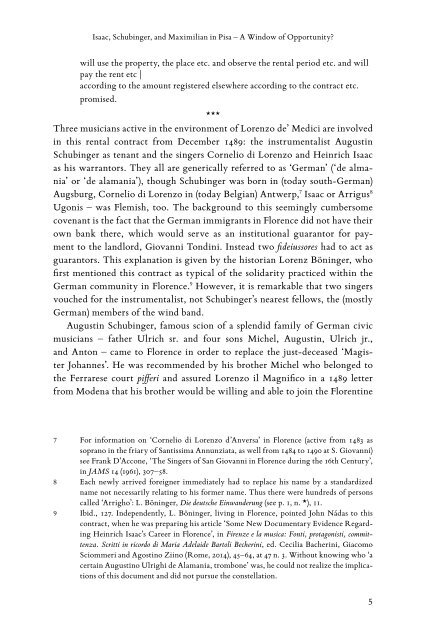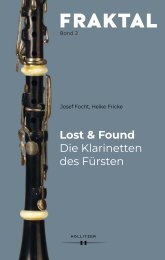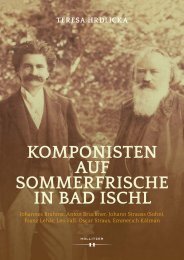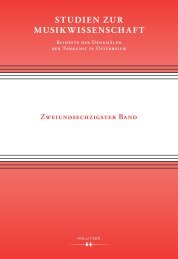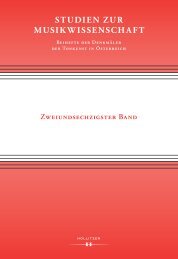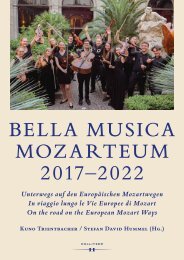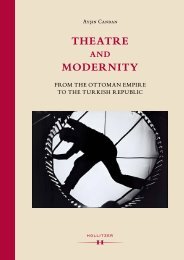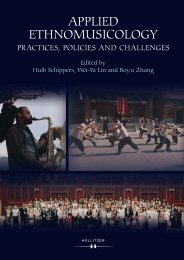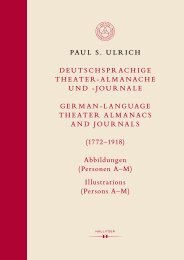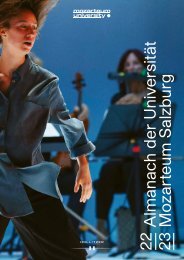Create successful ePaper yourself
Turn your PDF publications into a flip-book with our unique Google optimized e-Paper software.
<strong>Isaac</strong>, Schubinger, and Maximilian in Pisa – A Window of Opportunity?<br />
will use the property, the place etc. and observe the rental period etc. and will<br />
pay the rent etc |<br />
according to the amount registered elsewhere according to the contract etc.<br />
promised.<br />
***<br />
Three musicians active in the environment of Lorenzo de’ Medici are involved<br />
in this rental contract from December 1489: the instrumentalist Augustin<br />
Schubinger as tenant and the singers Cornelio di Lorenzo and Heinrich <strong>Isaac</strong><br />
as his warrantors. They all are generically referred to as ‘German’ (‘de almania’<br />
or ‘de alamania’), though Schubinger was born in (today south-German)<br />
Augsburg, Cornelio di Lorenzo in (today Belgian) Antwerp, 7 <strong>Isaac</strong> or Arrigus 8<br />
Ugonis – was Flemish, too. The background to this seemingly cumbersome<br />
covenant is the fact that the German immigrants in Florence did not have their<br />
own bank there, which would serve as an institutional guarantor for payment<br />
to the landlord, Giovanni Tondini. Instead two fideiussores had to act as<br />
guarantors. This explanation is given by the historian Lorenz Böninger, who<br />
first mentioned this contract as typical of the solidarity practiced within the<br />
German community in Florence. 9 However, it is remarkable that two singers<br />
vouched for the instrumentalist, not Schubinger’s nearest fellows, the (mostly<br />
German) members of the wind band.<br />
Augustin Schubinger, famous scion of a splendid family of German civic<br />
musicians – father Ulrich sr. and four sons Michel, Augustin, Ulrich jr.,<br />
and Anton – came to Florence in order to replace the just-deceased ‘Magister<br />
Johannes’. He was recommended by his brother Michel who belonged to<br />
the Ferrarese court pifferi and assured Lorenzo il Magnifico in a 1489 letter<br />
from Modena that his brother would be willing and able to join the Florentine<br />
7 For information on ‘Cornelio di Lorenzo d’Anversa’ in Florence (active from 1483 as<br />
soprano in the friary of Santissima Annunziata, as well from 1484 to 1490 at S. Giovanni)<br />
see Frank D’Accone, ‘The Singers of San Giovanni in Florence during the 16th Century’,<br />
in JAMS 14 (1961), 307–58.<br />
8 Each newly arrived foreigner immediately had to replace his name by a standardized<br />
name not necessarily relating to his former name. Thus there were hundreds of persons<br />
called ‘Arrigho’: L. Böninger, Die deutsche Einwanderung (see p. 1, n. *), 11.<br />
9 Ibid., 127. Independently, L. Böninger, living in Florence, pointed John Nádas to this<br />
contract, when he was preparing his article ‘Some New Documentary Evidence Regarding<br />
Heinrich <strong>Isaac</strong>’s Career in Florence’, in Firenze e la musica: Fonti, protagonisti, committenza.<br />
Scritti in ricordo di Maria Adelaide Bartoli Becherini, ed. Cecilia Bacherini, Giacomo<br />
Sciommeri and Agostino Ziino (Rome, 2014), 45–64, at 47 n. 3. Without knowing who ‘a<br />
certain Augustino Ulrighi de Alamania, trombone’ was, he could not realize the implications<br />
of this document and did not pursue the constellation.<br />
5


